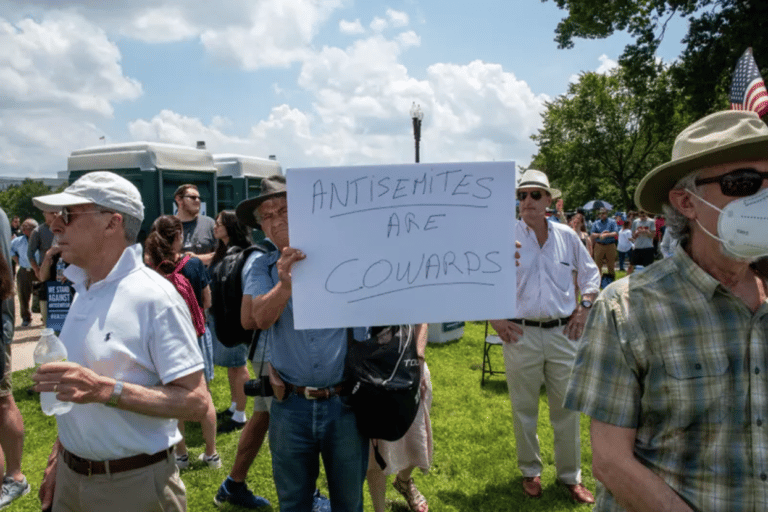
The front page of Jewish Reddit Monday morning summed it up perfectly: “I don’t like all this talk about Jews. It’s making me pretty uncomfortable.”
The sentiment isn’t wrong. Unlike past antisemitic incidents, it seems Kanye’s recent comments forced antisemitism into the spotlight everywhere. This time feels different. Yes, the comments dominated cable news coverage for days and filled social media with the usual suspects weighing in, but something else happened.
The scary thing about perpetuating/reporting on Kanye’s antisemitism is the hate filled ecosystem that it’s feeding into. pic.twitter.com/axn8ekcvE1
— Johnny Kunza (@johnkunza) October 24, 2022
This time around, you really couldn’t tune it out. Kanye’s comments, and the fallout that occurred, touched nearly every part of American society. From the celebrity news outlets following the story, to the business world weighing in, and even in the sports world. Even the homepage of ESPN reported on an antisemitic incident at the Florida-Georgia college football game over the weekend. This moment feels different for many of us. If you didn’t think America has a growing antisemitism problem, you do now.
Farakhan wasted no time. Kanye is on the cover of the newspapers they’re handing out with the big headline TRUTH.
— Johnny Kunza (@johnkunza) October 28, 2022
So how did we get here and where are we going?
What is actually going on?
As Jews we are very much used to holding paradoxes and we seem to be in another one. Arguably, it’s never been better to be a Jew than it is to be one in America today. But Kanye’s comments didn’t come out of nowhere — there has been a slow boil of Jewish hate brewing underneath American society for years. The numbers are clear on this.
According to the FBI, Jews are the number one targeted group for religious-based crimes. In 2020, approximately 60% of the religiously-motivated hate crimes committed in the U.S. targeted Jews (who make up less than 2% of the overall population in the U.S).
Zooming out, things are getting worse. According to the Anti-Defamation League, antisemitic incidents are being reported at record levels with incidents becoming more violent. There have been six major incidents in the past four years, this is a snapshot of where we are in America right now:
- El Paso, Texas, November 2020: Joseph Angel Alvarez allegedly murdered his Jewish attorney Georgette Kaufman, also wounding her husband. According to police, Alvarez said he was “executing and exterminating the pro-choice Jewish Satan worshippers.”
- Monsey, New York, December 2019: One person was killed and four others were wounded when Grafton Thomas attacked a Hanukkah party at a rabbi’s home with a machete. Investigators filed federal hate crime charges against Thomas after discovering antisemitic writings in his journal. Thomas has since been declared unfit to stand trial and was indefinitely committed to a psychiatric facility.
- Jersey City, New Jersey, December 2019: David Anderson and Francine Graham shot and killed three people at a kosher supermarket after killing a police officer in a nearby cemetery. The two suspects were killed in a shootout afterwards. Both Anderson and Graham had expressed Black Hebrew Israelite and antisemitic views in the past (the same beilefs espoused recently by Kanye West).
- Poway, California, April 2019: White supremacist John Earnest opened fire at a synagogue in Poway, California, killing one person and injuring three others. Earnest said he was attempting to copy the killing spree at a mosque in New Zealand that killed 51 people. Earnest was sentenced to life in prison plus 30 years.
- Pittsburgh, Pennsylvania, October 2018: White supremacist Robert Bowers murdered 11 people and injured seven more, including four police officers, while shouting antisemitic slurs during services at the Tree of Life Synagogue.
- Orange County, California, January 2018: Neo-Nazi Samuel Woodward killed his former high school acquaintance Blaze Bernstein. Woodward was charged with first-degree murder with a hate crime enhancement (Bernstein was Jewish and gay).
Back in May of 2021 I wrote the headline “No, it’s not just you. Jew hatred is rising” following an unprecedented wave of attacks on Jewish people during Israel’s conflict with Hamas (as Lord Rabbi Jonathan Sacks said back in 2016, “anti-Zionism is the new antisemitism). The genie unleashed during those times doesn’t seem to be wanting to go back into its bottle.
Is anti-Semitism rising? (A thread). It's a conversation we seem to be having more often in private. Normally we relegate these conversations to "nonsense talk" and "paranoia." But the consensus now seems to be that "yes, this feels different." For example, in the past week: 1/8
— Johnny Kunza (@johnkunza) August 10, 2020
And it’s not just here in the United States. Our friends up north in Canada are dealing with an uptick in Jewish hate as well, and the current situation in Europe remains as it has for years. For lack of a better term, it’s not great.
How could we respond?
The Jewish community marched against Jewish hate in 2020, and we rallied against fear a year later. I attended both of these events and the consensus seemed to be the same: “Things are getting worse, but they’ll never get that much worse, and if they do, what can we do?”
One thing we can do is listen.
“I’ve been through the Holocaust and I hate what is going on,” 89-year-old Claire Grunwald, a Holocaust survivor from Hungary, told me at the “No Fear” protest against antisemitism in Washington D.C.
Referring to the rise in antisemitic attacks, she added: “I feel this is how it started in Hungary. I was born in 1932, and I grew up with more and more hate for the Jews. I don’t want this to happen here to my children and my grandchildren.”
“I went through the Holocaust and I hate what is going on here because I feel this is how it started in Hungary.” Listen to this 89-year-old survivor explain why she attended today’s #NoFearRally. pic.twitter.com/B0ecrUNDRw
— Unpacked (@JewishUnpacked) July 11, 2021
Grunwald’s advice to me? Keep an eye on our politics: “So far, thank God, the government doesn’t solely agree,” she said.
Months later a swastika was found in a secure elevator leading to the Department of State’s antisemtism envoy’s office in a widely underreported story. Today we are dealing with openly antsemitic and anti-Zionist candidates running for political office in America.
Perhaps even more shockingly, a recent survey found that one in five American adults believe that political violence is justified in some circumstances. It doesn’t take much to connect the dots to see what could happen if these two ideologies match up, in fact we are already seeing it take place from both the left and the right.
We need to keep listening to Grunwald’s advice.
We need to keep calling out hate and we need to do it when it isn’t trendy. We need to do it when it’s inconvenient. And we need to do it when it’s from someone we normally agree with. This is what is going to cause real, lasting impact.
If a group, business, person, politician, public figure that you like has an antisemitic side stop associating with them. Leave that Facebook group that constantly posts antisemitic memes. Don’t take part in that advocacy group that bans Jews. Don’t vote for that politician who constantly dabbles in dog whistles.
Where do we go from here?
Like it or not, the recent comments made by Kanye has a lot of people talking about America’s relationship with its Jewish citizens. Some of the more popular search strings on Google this past week include:
- Why do people hate Jews?
- Jewish supremacy
But there is also hope. Many people also searched:
- Stand up to Jewish hate
And that’s what we can do. My colleague, Sara Himeles last week provided great examples on what we can do to fight antisemitism.
Now, back to that paradox of what it’s like to be Jewish in America today.
Rabbi Sacks once wrote: “No Jew who knows Jewish history can be an optimist.”
I admit, I was first taken aback by his strong words as I am more familiar with Rabbi Sacks’ more optimistic side, more used to quotes like these:
“The Jewish people [are] proof that you can suffer centuries of persecution and exile and still survive and flourish, recovering from every defeat and turning every setback into a matrix of renewal. You can be written off by the world and prove time and again that the world was wrong. Inspired by high ideals and a respect for human dignity, you can outlast any empire. You can suffer and yet sing, walk through the valley of the shadow of death and emerge, limping but undefeated, into the light of new life. Time and again Jews have shown how you can defeat probability by the power of possibility.”
But, both can be true. America is at a crossroads moment. We are living it and, in one breath, we can be concerned but also secure in the fact that we as a people are not going anywhere.
Originally Published Nov 1, 2022 12:02AM EDT


